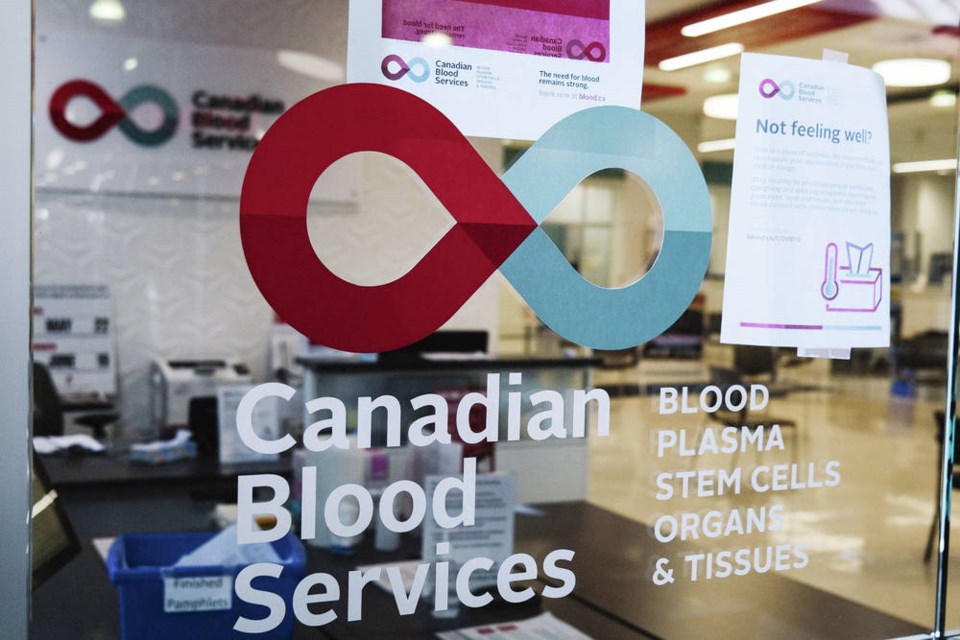The Canadian Blood Services agency, which runs our country’s blood donation system, has opened a new plasma collection centre in Kelowna.
Plasma is the straw-coloured liquid contained in whole blood. It can be transfused directly to treat a variety of life-threatening diseases, including leukemia, and immune-system disorders such as myasthenia gravis. It can also be processed to manufacture specialized products used to treat disorders like hemophilia.
That Kelowna, a relatively small community, was chosen as only the third plasma centre in Canada is a tribute to the generosity of local blood donors. The same has been true at the first two sites, Sudbury and Lethbridge, where plasma donations from day one exceeded Canadian Blood Services’ projections.
Despite the fact that plasma clinics will no longer collect whole blood (other collection centres remain open for that purpose), donors have obviously responded generously to the emerging need for plasma.
Five more centres are planned in the near future, as experience is gained at the first three sites.
In the past, plasma was separated by putting whole blood through a centrifuge. That process, while it still continues, is time-consuming and inefficient.
At the new centre in Kelowna, donors have their blood separated immediately while the IV line remains in place. The plasma is syphoned off and the remaining blood components returned to the donor, all in one operation.
Because most of the blood is returned, donors can give plasma more frequently. That also can increase the supply.
And that is the critical issue. Some decades ago, Canada was self sufficient in plasma. But as more and more diseases are being found treatable with plasma, or plasma-derived products, we’ve fallen far short of sufficiency.
Currently, we generate about 25 per cent of our need. The rest is purchased from abroad, much of it from the U.S.
But while in the past we were able to buy what we needed from safe and reliable offshore suppliers, that practice is now threatened by rapidly expanding worldwide demand.
Prices are rising, and the prospect of an overall shortage is very real. And while the spectre of export controls has not been raised to date, our recent experience with international vaccine availability is sobering.
It has been suggested that we could increase the supply of plasma by paying donors. The U.S. follows this practice.
But there are dangers in such an approach. It might discourage volunteer donors from coming forward. That would be a disaster for our blood- collection efforts.
In addition, it turns an act of community service into a commercial transaction. Do we really want to go down that road?
In the months and years ahead, the Canadian government will face questions about the adequacy of our preparedness for natural disasters like the COVID pandemic. One side of this debate will argue that Canada should strive for greater self-sufficiency despite the costs; the other side will argue that global supply chains are more efficient and cost-effective.
The plan to increase plasma self-sufficiency is a helpful example of what can work; namely, a steady, incremental approach based on lessons learned at each stage.
It should also be mentioned that blood donations are at present in high demand. Hospitals across B.C. are ramping up surgeries to make up for those postponed at the outset of the COVID-19 outbreak.
The message is this: Blood and plasma infusions are a vital part of many surgical procedures. And some patients with bleeding disorders like hemophilia may require life-long treatment with clotting factors distilled from plasma. Their ongoing health and well-being rests in our hands.
Many of us have never heard of the Canadian Blood Services Agency. It works, in a sense, behind the scenes, dependent entirely on volunteer donations. But the contribution it makes to our country’s well-being is critical.
We would encourage readers to book an appointment at 1-888-236-6283, or by visiting blood.ca.



